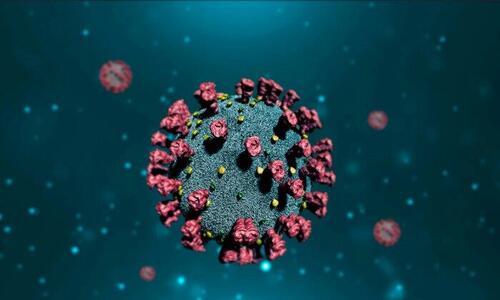COVID Severity Not Affected By Viral Load Upon First Infection: Study
Authored by Marina Zhang via The Epoch Times (emphasis ours),
The viral load or quantity of SARS-CoV-2 in the nasal cavity does not predict disease severity, according to a recent JAMA Network Open study.
“We observed considerable variability in VL (viral load) at diagnosis,” the authors wrote. “Intriguingly, we did not find an association between VL at diagnosis and severe COVID-19 in this largely outpatient setting.”
COVID-19 virus. (Kitreel/Shutterstock)
The findings contradict those of earlier studies that found that patients with severe COVID-19 presentations tended to have a high viral load.
“The findings of this study suggest that caution should be exercised in the use of individual-level viral load … as a surrogate for COVID-19 severity, especially given increasing diversity in preexisting immunity,” the authors added.
The study authors followed uninfected and unvaccinated people who were part of the placebo group in COVID-19 vaccine trials, finding high variability in viral load that could not be explained.
Disease Severity Depends on Individual Immunity
Dr. William Schaffner, a professor of preventive medicine at Vanderbilt University Medical Center who was not involved in the study, said he was not too surprised at the findings. He added that COVID pneumonia, a complication associated with severe COVID-19, is known to be determined by the body’s immune response and less so by viral load.
“It’s our immune response that determines [disease] severity. So the vigor of our immune response is largely associated with the pneumonia that occurs,” Dr. Schaffner said.
SARS-CoV-2 infects the body in two phases. The first is when the virus attaches to the cells in the nasal cavity and the upper respiratory tract. Symptoms tend to be mild at this stage.
In the second phase, the virus reaches the lower respiratory tract and can start disseminating into the body.
Some people’s immune systems may mount a highly inflammatory response to the virus, which can transform into severe disease; others may have mild or asymptomatic disease.
Studies have offered different explanations for severe COVID-19 disease. Older people or those with metabolic disease tend to be the most at risk of developing severe COVID-19. However, other research has shown that the reason for these different manifestations may be genetic.
People who have had a prior infection or been vaccinated tend to be protected from future infections and symptoms.
Mucosal Vaccines Reconsidered
While the study showed that high exposure to the virus couldn’t guarantee severe disease, the findings do not suggest that people will not become infected.
“Being in a crowded area or near to someone who is infected would increase the likelihood of becoming infected,” Dr. Stanley Perlman, a professor of microbiology and immunology at the University of Iowa, told The Epoch Times.
The authors said that the study’s findings are particularly relevant to the development of COVID-19 mucosal vaccines.
The study’s findings would primarily affect “evaluating mucosal vaccine efficacy, since viral load will not necessarily reflect effects on clinical disease,” said Dr. Perlman.
Dr. Schaffner said mucosal vaccines for COVID-19 may still be relevant.
“The mucosal vaccines are, in theory, designed to prevent that initial infection,” Dr. Schaffner said. “We could prevent [the virus from initiating infections in the cells] or reduce the likelihood that, even though you’re exposed, the virus could not get established in your body and put you at risk of more severe disease.”
Tyler Durden
Tue, 06/11/2024 – 05:00


Recent Comments